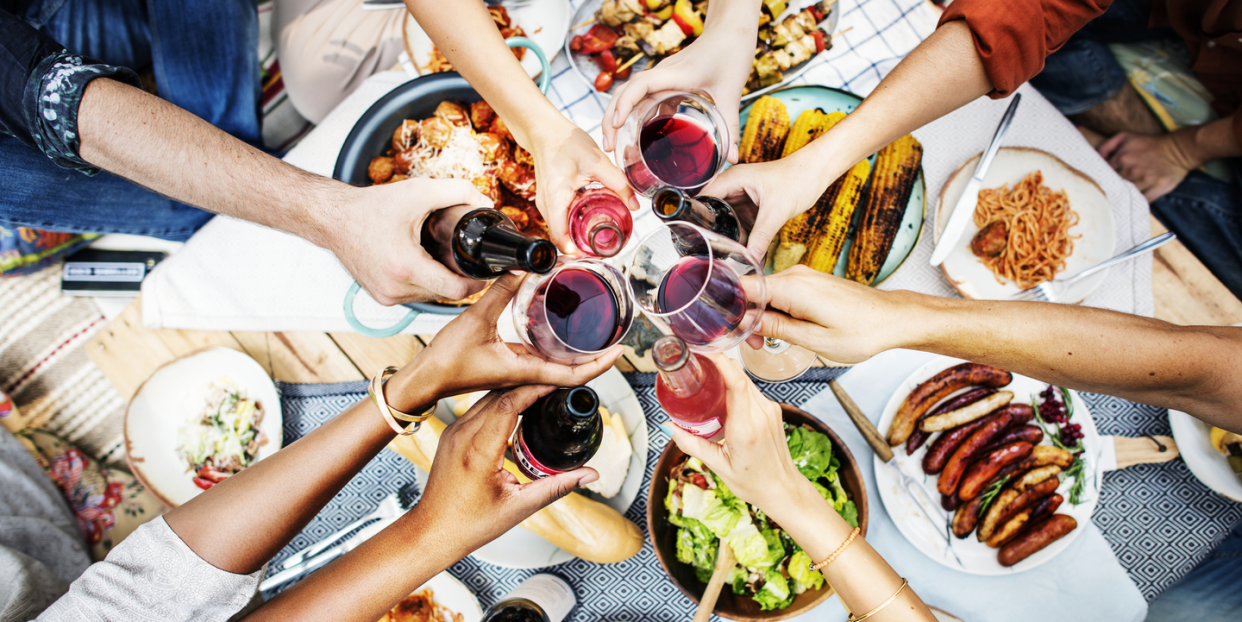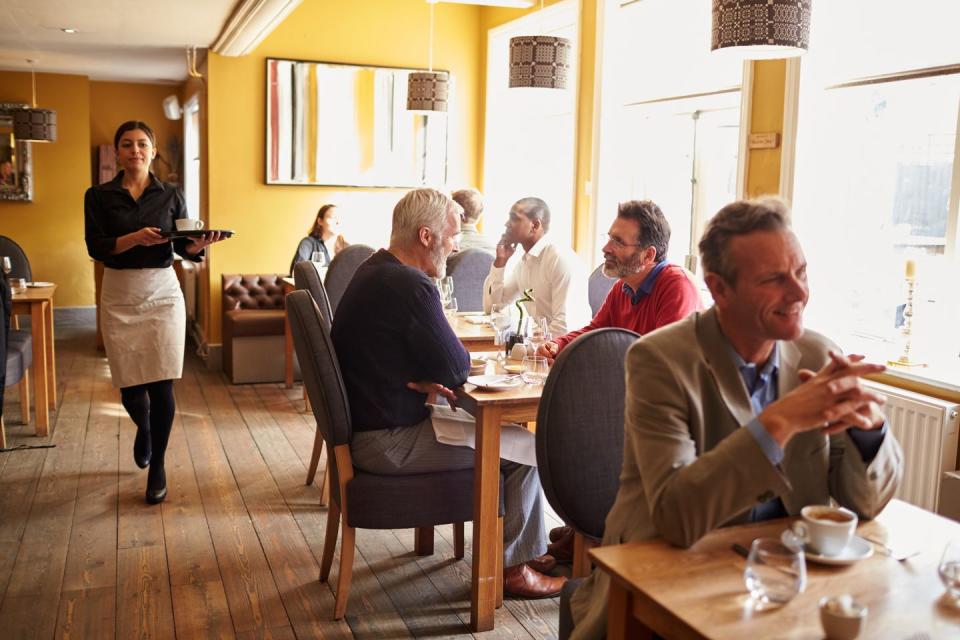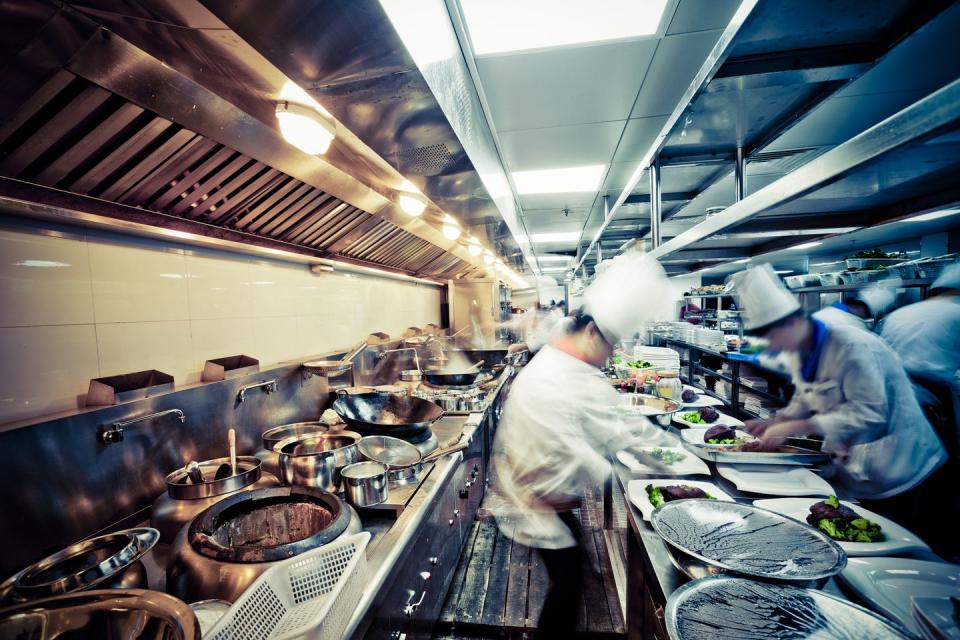The Restaurant Industry Had a Contagion Issue Before the Pandemic

One morning in 2013, Amanda* texted her fellow servers at a seafood restaurant in New Orleans to see if someone would pick up her double-shift that day. Amanda, then 23 years old, had vomited several times throughout the night. As the nausea and sharp stomach pain continued to impede her ability to stand up straight, her coworkers declined to help.
The restaurant didn’t offer paid sick days, and if Amanda called-off work without finding someone to fill in, she needed to provide a doctor’s note stating that she was too ill to be at the restaurant. Failure to do this meant termination. But, she didn’t have health insurance, and the loss of tip money, plus the cost of a doctor’s visit, would have taken a big chunk out of her monthly budget.
This marked the first time Amanda had been sick without her mother, who had died in a car accident two years earlier. She didn’t know if she had food poisoning, the flu, or something worse, and she was scared. Amanda's roommate at the time had taken her in after her mother died. Though only three years older, the roommate filled a parental void because she was the service manager who had trained Amanda.
Her roommate held Amanda's hair every time she crouched in front of the toilet that night. As they kneeled on the cold linoleum floor, Amanda swore she hadn’t been drinking. “I don’t know what’s wrong with me,” Amanda said, her head hovering above the rim. In the back of both of their minds, they worried about bills. “If Amanda couldn’t work, we didn’t know how we were going to make it through the month,” her roommate recalls to me.
Desperate to remain in bed and not wait on customers, Amanda called her manager. She hoped he would hear the pain in her voice, wave restaurant policy this one time, and allow her to stay home without a doctor’s note. But Amanda and her roommate knew that would take a miracle. They described the then-manager as pushy, mean, and not compassionate toward sick employees. Amanda relayed her symptoms to him, but she said he didn’t care.
“He told me that if I didn’t come in, he’d consider it a no-call-no-show and fire me,” she says.
Before the seafood restaurant, Amanda had waited tables at a nearby bistro for four years. Her roommate described Amanda as a charismatic server, who was fun to work with and good at up-selling menu items to customers. A current co-worker said she learned what it means to be a hard worker from watching Amanda in action.
Amanda went into work that day knowing she might infect hundreds of people with what she had—if what she had was contagious; she didn’t know and was growing more scared with each surge of pain. Despite looking pale and sweaty when she arrived at the restaurant, Amanda said she received two tables at the beginning of the eight-hour shift.
However, her stomach pain was so piercing that she felt like she might collapse. She sat down at a round table in a side room before her guests had received their salads. She kept the side room doors narrowly open so she could watch her section as she rested, hoping the pain would subside. Soon, the manager entered. He was short, tan, muscular and always wore a tight dress shirt. He had a reputation for punishing sick employees by cutting their shift total or assigning them sections that weren’t as lucrative as others.

Amanda rested her head on her arms, folded over the tabletop. Looking up at the manager, she begged him to let her rest for an hour. She feared his vindictiveness, but she was in too much pain to work, and she couldn’t afford to go to the hospital. She felt trapped and confused. She needed compassion. She missed her mom. “And he acted as if I was lying,” Amanda says now. The manager transferred her tables to another server and told Amanda to leave. “He was like: ‘If you’re so sick, go straight to the emergency room, and if you don’t come back with a [doctor’s] note, then don’t come back because you won’t have a job.’”
At the hospital, Amanda was diagnosed with having two kidney stones and three cysts on her ovaries. She was given a prescription for Percocet for her pain, Allopurinol for the kidney stones, and a note for her manager. She returned to work the next day. She struggled to pay bills, but she said she got lucky considering the diagnosis. Her pain was controllable, she passed the kidney stones, and the cysts disappeared without an expensive surgery.
Stories like this are happening hundreds of times a day across the United States,” says Todd Manuel, owner of Majestic Kitchen in Ridgeland, MS. Saru Jayaraman, director of UC Berkeley’s Food Labor Research Center, agrees. “This story is the norm, not the exception,” she says.
A side-effect of this environment: Restaurant workers who are forced to work sick have to go to great lengths to hide their symptoms. “I’ve done shots of DayQuil with other servers before shifts,” explains a Pennsylvania server, who spoke on the condition of anonymity. Others interviewed explained how they hide cough drops in their apron pockets, drink hot tea with lemon and honey every time they stop by the service station, and run into the bathroom to blow their nose in private. The goal, they said, is to wash your hands every few minutes given the amount of food, plates, glasses and pieces of silverware one comes in contact with during a shift. But sometimes the most dangerous part occurs while communicating.
“You have any idea how hard it is to hold back a cough when you’re talking to a table of customers with an itchy throat?” Amanda says.
Line cooks work sick more often than servers because customers can’t see them, according to Brandon Blietz, an executive steward who oversees operations at five locations for a major chain in the Midwest. Blietz, 45, has worked as a line cook, dining room manager, production manager and a general manager during his 30 years in the industry, and he said toxic masculinity among kitchen staff plays a huge role with the problem.
“I’ve seen line cooks who look miserable, three different shades of green,” he says. “Early in my career, I would see cooks with a trash can close by because they had to pay their bills. They’d vomit in the trash can and say, ‘No, no, no. I’m OK! I’m OK!’ It was a machismo thing.”
Going out to a restaurant is an intimate experience, but the proximity of restaurant employees to customers and their food puts people at risk if members of the staff are sick. Amy Edwards, M.D., associate medical director of pediatric infection control at Rainbow Babies and Children’s Hospital in Cleveland, said the danger-level depends on the illness.
“Some viruses require very close contact, others can be spread by droplet, making the chances of spreading different in different situations,” she says. “For people in food service, the risk of transmission is high.”
When line cooks who are sick prepare food, they can pass along a virus through the fecal-oral-route, according to Gail Shust, M.D., pediatric infectious disease specialist at NYU Langone’s Hassenfeld Children’s Hospital.
“If a sick food preparer uses the bathroom, and they don't wash their hands perfectly, norovirus can infect food, it can infect surfaces, and then it can contaminate food and water sources,” Dr. Shust says.
70% of foodborne norovirus outbreaks were caused by infected restaurant employees who touch or serve food, according to a 2014 CDC report.
Amanda's story and the nine other current or former restaurant employees interviewed for this story illustrate that the industry’s approach to sick employees was broken before the pandemic. A 2014 report from the Centers for Disease Control and Prevention (CDC) showed that 70% of foodborne norovirus outbreaks were caused by infected restaurant employees who touch or serve food. In 2015, a survey by the Center for Research and Public Policyrevealed that 51% of food workers said they “always” or “frequently” work sick, while another 38% said they “sometimes” work when they’re ailing. The survey also indicated that 45% of the workers perform under these conditions because they can’t afford to miss work. I worked as a server and bartender, full and part-time, in Pittsburgh for almost a decade, and not only was I forced to work sick at times, but most of my coworkers were too. The fact that COVID-19 has put 8 million restaurant employees out of work is bad enough. But what will be even worse is if this time goes unused. The industry has to change, but the question is: How?
Manuel, 39, has worked in the restaurant industry for 23 years. He managed a chain restaurant in Mississippi before becoming the independent operator of Majestic Kitchen, and he thinks there are only two possible solutions to improve how the industry treats sick employees: “A single-payer healthcare system or unions,” he says.
A single-payer healthcare system can come in different forms, but in America it’s commonly referred to as “Medicare for All,” and it has the support of 55% of American voters. However, it’s not popular among Republican lawmakers, which means it might be a while before it becomes a reality.
“I think it’s insane that we’re not moving toward a single-payer system,” Manuel says.
He explained that universal healthcare would make it much easier for restaurant employees to get a doctor’s note when they’re sick. He said it also would help alleviate the industry’s problems surrounding mental health and addiction. But, if a single-payer system doesn’t happen soon, Manuel said he hopes employees unionize. “There’s no other way because it’s so cheap to replace them,” he adds.
The push for restaurant employees to unionize began in 2012, when the Fight for $15 movement was launched. With support from organizations like the Service Employees International Union and Fast Food Justice, the movement has seen some success. Many who want to unionize have sought to eliminate the tipped minimum wage of $2.13 an hour, and seven states have raised it, while 10 more have introduced bills to do the same.
Offering paid sick leave has been suggested as one solution to prevent stories like Amanda's from occurring. Prior to the pandemic, 12 states and Washington D.C. offered paid sick time to restaurant workers, and in March, Darden, the world’s largest full-service restaurant corporation began offering it to its employees.
But servers often don’t use the benefit because they earn more money from tips than they do the tipped minimum wage alone. “Paid sick leave benefits are critical, but not enough,” explains Jayaraman, president of One Fair Wage, a nonprofit advocating for raising the subminimum wage for restaurant employees. “Unless we can do both—a full minimum wage, with tips on top, and paid sick leave—we are not now, nor in the future, going to prevent restaurant workers from working when sick. And clearly that's going to be more of an issue coming out of this.”
As restaurants begin to reopen this spring, Jayaraman said that it’s imperative for employees to stand up for themselves. But when it’s so easy to be replaced, how do workers advocate for themselves? “Know your rights,” says Alanna Fino, who has worked in the restaurant industry in Buffalo for more than 25 years.
Fino explained that, until unions become the norm, coworkers must show solidarity. “I’ve spoken up when someone was being mistreated,” she says. “I’ve also quit very loudly when working in toxic environments. That helps too.”
The managers are stuck in the middle. Everyone interviewed expressed respect and admiration for the good managers under whom they’ve worked. But Blietz said the industry has a problem with bad managers who weren’t trained properly and lack empathy. Blietz said that he never forced anyone to work sick as a manager because he had hated how he was treated early in his career. But Manuel admitted to enforcing the same rules Amanda had to follow.

“It's hard to tell someone something you know is unethical or you don't want them to do,” he says. “But it's like, my general manager is saying I got to do this, and if I don't do this, then I don't have a job, and my job is more important.”
Restaurant managers are trapped by the same rules. Blietz said that it’s usually harder for a manager to find someone to cover for them when they’re sick than it is for a server or line cook. Manuel agreed, explaining that if a manager calls in sick, it can cost them their job, possibly even end their career.
“We're talking about self-survival,” Manuel says of his time as a chain restaurant manager. “If I have to eat by coming to work sick, then I do. And if I have to tell someone they're fired because they don't come to work sick, then I do it because I still have to eat.”
At Majestic Kitchen, Manuel offers his managers health insurance, and he allows the rest of his staff to call-off sick. When he opened the restaurant two years ago, he made these policy choices based on what he had experienced in his career. But now, with budget concerns and thin profit margins, he recognizes how challenging it is from an owner’s point of view.
“I can’t raise my prices 20% and provide everyone health care if customers quit coming,” he says. “Because no other restaurants are doing it, and then I don’t have a business.”
*Name has been changed.
Support from readers like you helps us do our best work. Go here to subscribe to Prevention and get 12 FREE gifts. And sign up for our FREE newsletter here for daily health, nutrition, and fitness advice.
You Might Also Like

